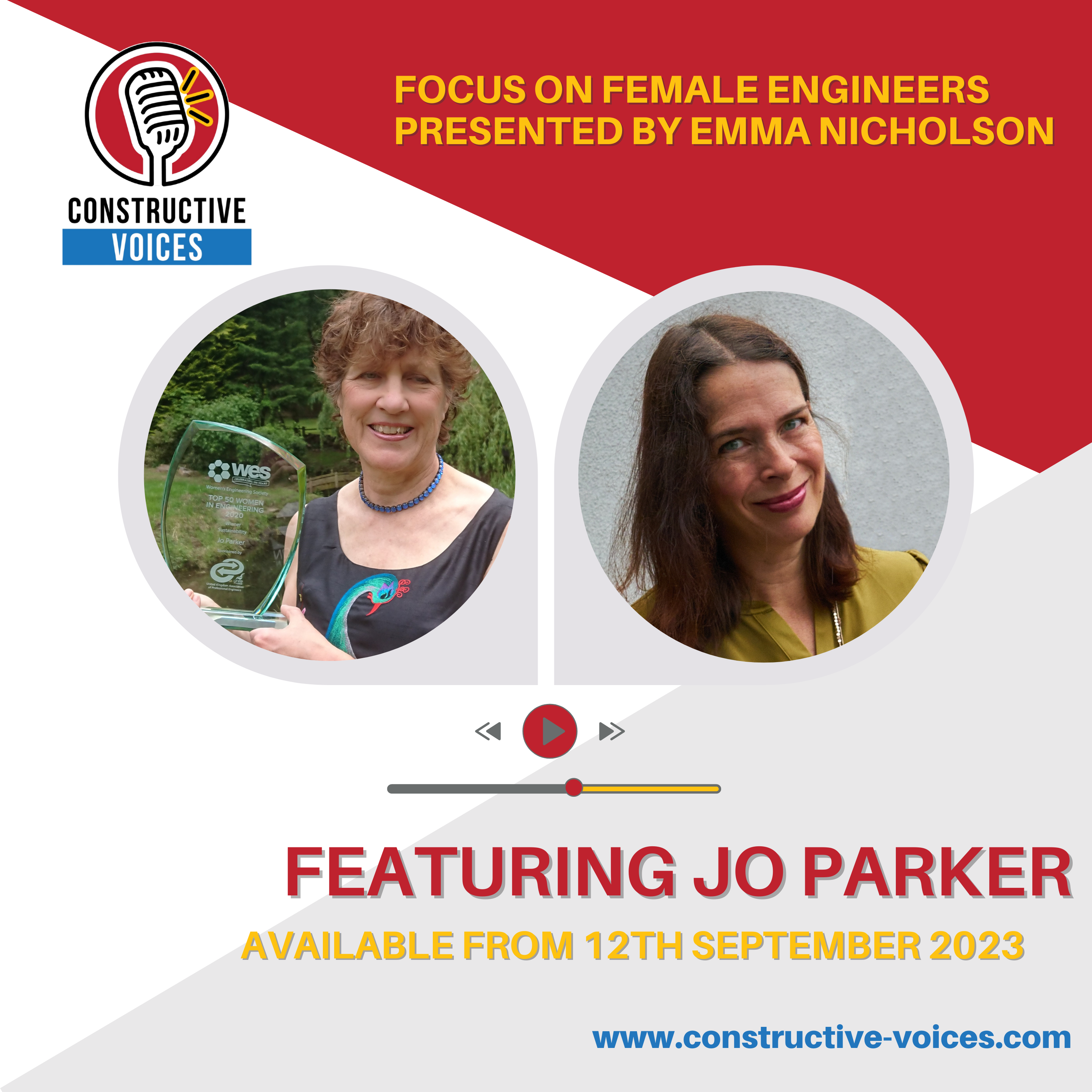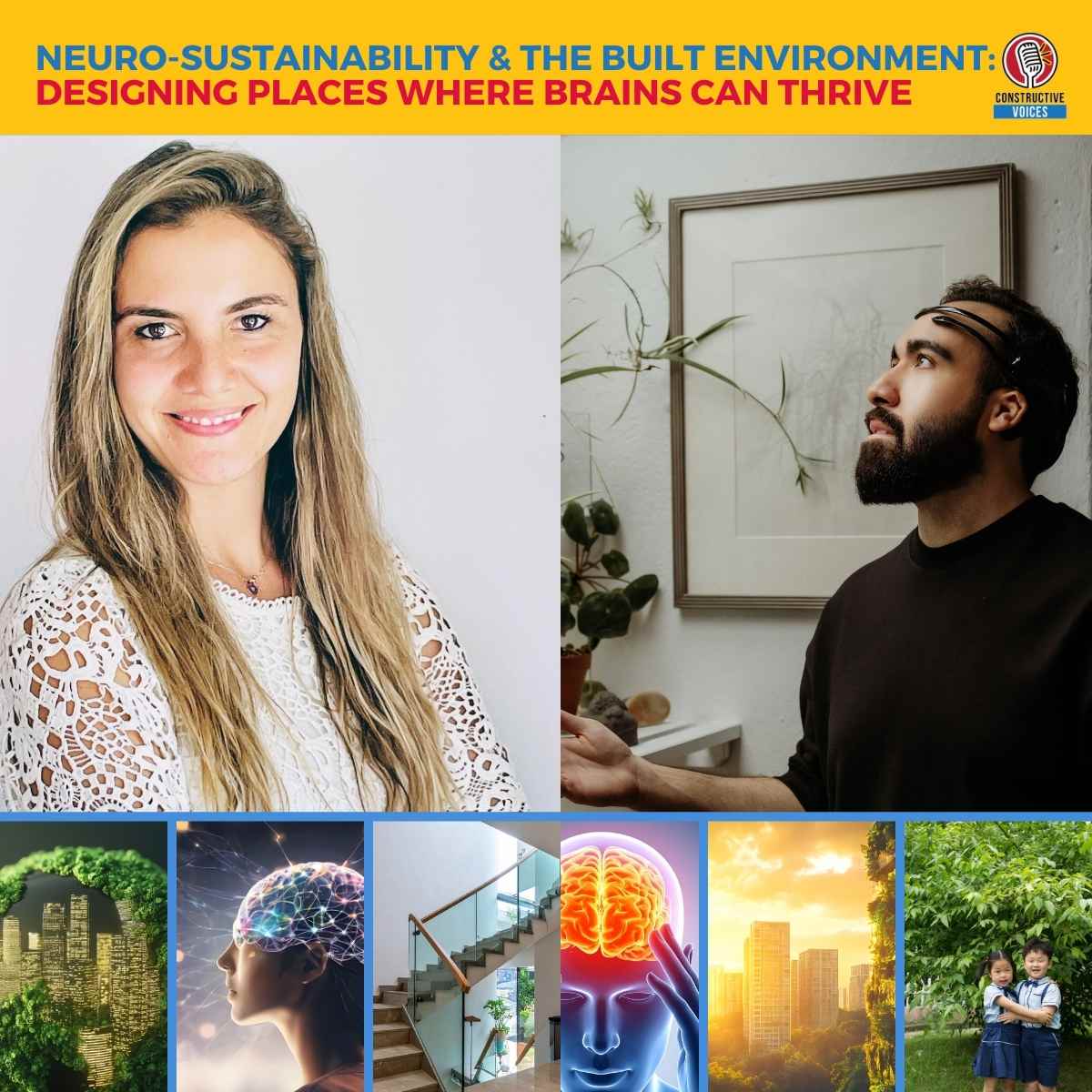Episode Transcript
[00:00:00] Speaker A: This is constructive voices. It is such fun to revisit our earlier work, especially when the featured guest and company have made such an impact in the three years since this recording. Listen to how well it can work when a colleague does the interview. Phil Carpenter also lives and breathes Alice Technologies, so he was the perfect choice to talk to his CEO, Rene Morcose. At the beginning of this snippet, you will hear some of the constructive voices team bantering about the subject matter.
[00:00:31] Speaker B: There's huge opportunities here for companies in the US to sell to Europe and to the rest of the world, and vice versa. In the construction sector, there's so many opportunities and there's so much spaces there that people can step into and can fill these voids. So it's really exciting times, and there's a lot still to be played out in this story, you know?
[00:00:54] Speaker C: Yeah, absolutely. And as you mentioned, we are going to be staying stateside with a Stanford professor, talking more about artificial intelligence and other technology. Pete, we'll chat again. Well, next time, assuming we haven't been replaced by robots of some sort.
[00:01:11] Speaker B: Thank you, Steve. It was very good to talk to you.
[00:01:15] Speaker C: I think that was Pete.
[00:01:18] Speaker D: Cheers, Steve.
[00:01:18] Speaker B: Great to talk to me.
[00:01:20] Speaker A: Constructive voices, the podcast for the construction people.
[00:01:25] Speaker C: Now, technology increasingly plays a part in almost every aspect of our lives, both at home and at work. But what about specifically artificial intelligence, or AI? How can that help the construction industry to build bigger, better? We've been finding out more. Phil Carpenter has been speaking to Rene Maurkos, who's the CEO and founder of Alice Technologies, and asked him first to explain what Alice is.
[00:01:53] Speaker D: Alice is an acronym that stands for artificial intelligence, construction engineering. And so it is the world's first generative construction simulator. It's a bit of a mouthful, but it's actually pretty simple. And so what that means is it's a tool that enables you to take large projects, put them into the software, and Alice will generate millions of different ways of building a given project. And she does this by building it with one crane, two cranes. Overtime, no overtime, 20 steel crews, 23 steel crews, 25 steel crews, and so on and so forth, going through lots and lots of permutations. And every time you change one of these input variables, Alice propagates that change through the entire system and resimulates the entire construction project. So you can immediately see the impact that a delay will have, or a design change will have, or a different type of concrete or different production rate, or whatever it is that you're trying to figure out. That's what Alice is first system on the wall that can do that. If you would tell us a little bit about your background and why you started Alice technologies. I'm a second generation civil engineer. So when I graduated high school, my dad gave me a good piece of advice. He said, son, study anything you want. Just don't study civil engineering. I was like, great. That's it. I didn't know what I want to do with my life before this, but now it's clear to me. And so I obviously went and studied civil engineering.
I've built stuff. I built stuff around the world.
You name it, pretty much, I built it. I've done underwater pipelines. I've done $350 million gas refinery in Abu Dhabi. I was in Afghanistan for a year. I always liked building the concept of going somewhere and putting something into reality that didn't exist before and that thing being very big and outliving. You just always jazzed me that would get me out of bed in the morning. I really liked it. I liked coming home with concrete in my hair. I really liked building stuff. And so, long story short, I ended up doing a PhD at Stanford. There's kind of these two moments. One was in Afghanistan. I was building these landing strips for f, was trying to figure out how to sequence the people that I had on site. What are the optimal sequence? I'm trying to figure it out. A large slab, probably 23 different pieces in that slab, or 24 and 30 people. And how do you sequence it? And that seemed like a very simple problem.
After doing my PhD, I realized, like, God, that was actually relatively complicated. The other thing I started to look at was space usage. And this is kind of an interesting sort of observation. Look at any construction site. Drive down the road, look at a construction site. It's going to be empty. There might be a pocket or two of work, very intense work, but generally, the construction sites are empty. And so I measured in my PhD, we took these photographs on site and measured that, on average, 3% of construction site space is used for construction. 3%. So it's like, holy cow, this is a really low number. Other industries have asset utilizations in the order of 50, 60, maybe even 70%. And so started researching, how do you increase space usage while avoiding spatial clashes? You don't want people working on top of each other. It's unsafe. And so I started developing these algorithms that would do that, generate options. And that journey really led me to build Alice, which was, there's a moment where I suddenly realized, like, wait, these algorithms aren't just optimizing space usage, but they're actually building. That was, like, this big moment for me in my life, right? It was like, hold the horses. Like, what the heck? Like, this algorithm knows how to build. I remember kind of telling my. Jumping up and down, like, this thing knows how to build.
Which I was always like, hey, I've been doing this for that point a good six, seven, maybe eight years, right? But, yeah, suddenly it's been a really beautiful journey. And I remember thinking at the time, Alice knows how to build. She doesn't know how to build very well. And so she didn't know how to model cranes, and she didn't understand calendars, and she didn't understand labor and understand consumable reusable, right? So we slowly taught her all these little concepts, right, over the last six years. And sometime around two years ago, we cracked it, technically. And when you were doing your PhD work, Renee, did you have advisors or colleagues or even fellow students who said, wow, you're onto something like, this could be a company, you know, not in the beginning. And that's kind of, I think, the really beautiful thing about it, right? People always say, like, do what you love. Like, I can tell you, Phil, that the first four years, you know, maybe four and a half, five years, like, there was no. No inkling that this would ever be useful. I was tanking around in the lab, and I was happy. I was happy as a climb. I was working, you know, sometimes 1920, 18 hours a day, seven days a week, and I was just futzing around with these, like, little algorithms. You know, I was like, oh, this is so much fun. Like, I can't believe that I get to just sit here and do this. As a PhD, obviously, you don't really earn anything, but you get to kind of just play around with these things. And that was it. There was a point at which suddenly my advisor at Stanford was like, I deleted these algorithms. And he said, go validate it with a project manager. And that's a very Stanford thing. It's got to be bounded in reality. And I remember saying, but, john, this guy's in Amsterdam. And the response was, I don't care if he's on the moon. Go validate with the PM.
Thought to myself, you know, what the heck? So I called the guys up in Amsterdam and said, hey, do you want a free week of consulting? Because I couldn't afford a plane ticket. And they said, yeah, sure. So I said, okay, I just have to talk to Willem at 04:00 p.m. on a Friday. So I flew down there, and I showed it to Willem, and that was the moment Willem kind of double checked my work, and that's when it hit me. I was like, my God, this thing knows how to build. So I got back on the plane, flying across the Atlantic, kind of sipping on a Heineken. I'm just like, this algorithm knows how to build. So I kind of got back to Stanford, started playing with it, and then I entered this basis competition.
It stands for the business association of Stanford Entrepreneurial Students. We won this competition. We voted, like, the best product coming out of Stanford. And that's kind of when it started to become like, hey, other people think this thing is really cool.
[00:08:04] Speaker C: Yeah.
[00:08:04] Speaker D: And then suddenly we raised some money, and one thing led to another, and they said, the best companies aren't founded, they just happen. And that was definitely the case with Alice. Great story.
[00:08:14] Speaker A: This entire interview was around 20 minutes in duration. Spotlight sessions can be set up to be as short as five minutes or as long as you need. Discover more case studies on constructive dash voices.com stories. That is constructive dash voices.com stories.
This is constructive voices.


